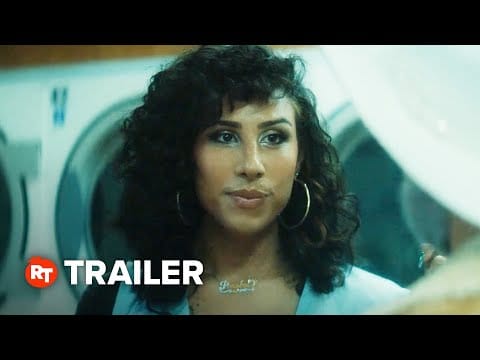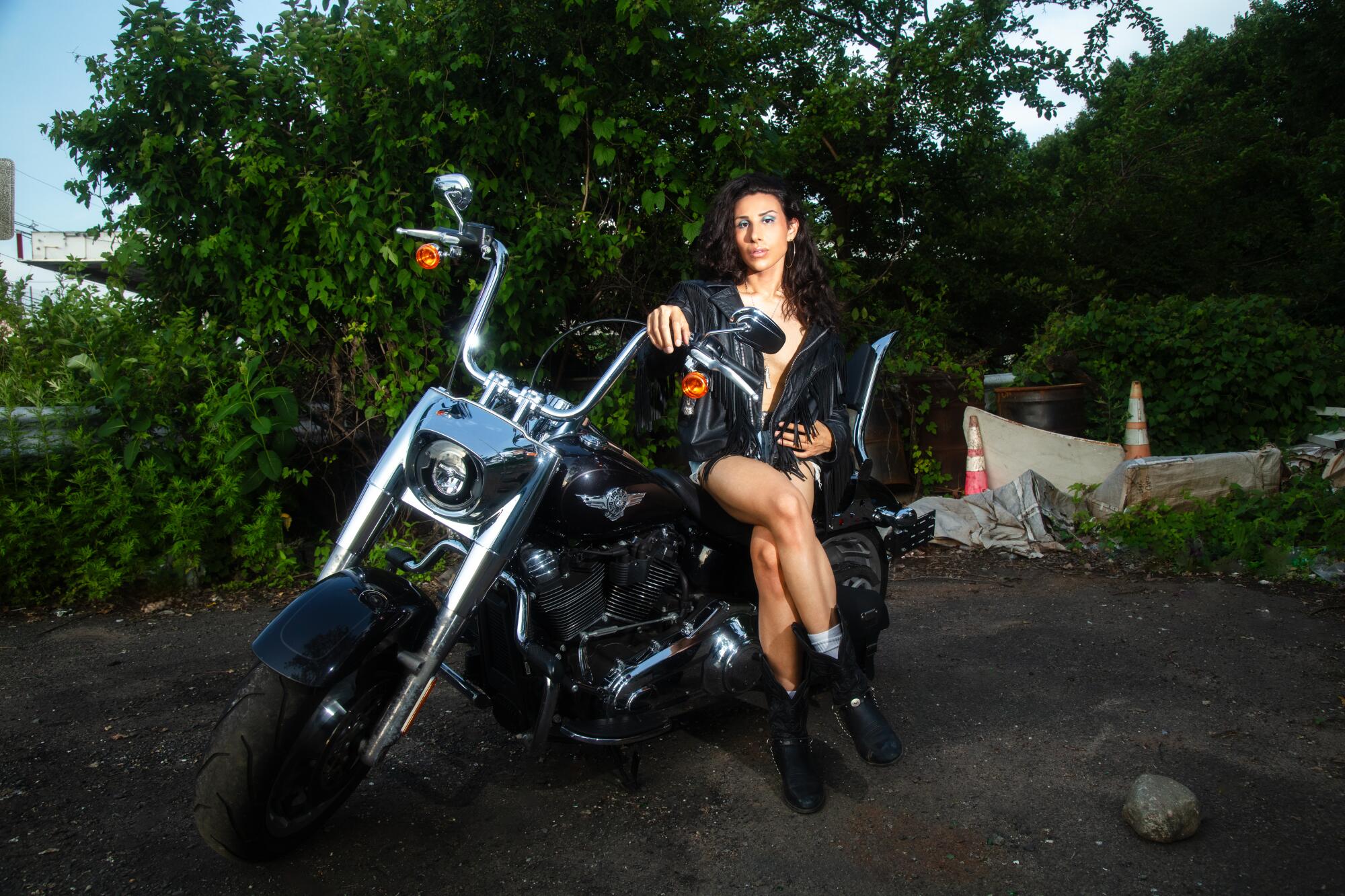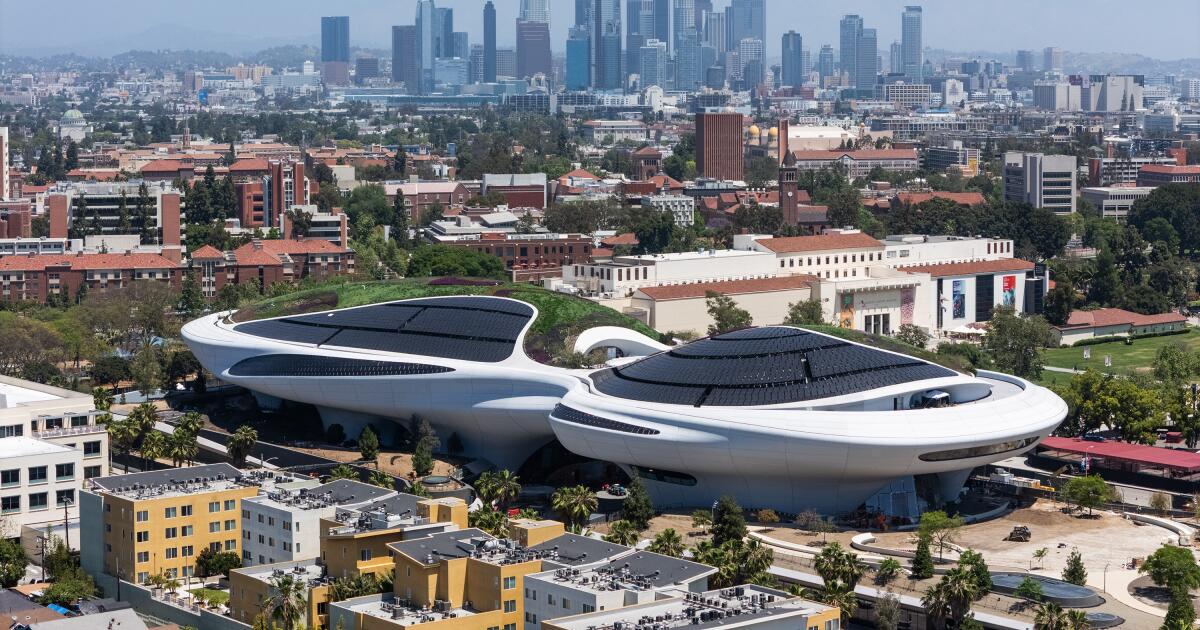In new indie flick ‘Ponyboi,’ River Gallo sheds light on an intersex experience
“How the f— does this baby know if she loves her father?” asked River Gallo one day at Walmart, back in 2010, when they saw an infant sucking on a pacifier emblazoned with the words “I love my daddy.”
“That started the ball rolling about my own issues with my father and with this compulsory love that we have with our families, specifically with our parents, specifically in this instance with my father, her father, our fathers, and with masculinity in general,” says a radiant Gallo during a recent video interview.
The spontaneous moment of introspection planted the seed for what became a 10-minute performance piece while studying acting at NYU — then their USC thesis-turned-short film “Ponyboi,” released in 2017, which Gallo wrote, starred in, and co-directed with Sadé Clacken Joseph. That project ultimately evolved into “Ponyboi” the feature, which premiered at the Sundance Film Festival in 2024, became the first film produced under Fox Entertainment Studios’ indie label, Tideline, and was released June 27 in theaters across the United States.

A consummate multihyphenate, Gallo again wrote the screenplay, served as producer and stars as the titular character: an intersex, Latine sex worker in New Jersey who is desperate to escape their pimp (played by Dylan O’Brien) and the world of crime and violence that surrounds them.
Flashbacks to Ponyboi’s childhood, made difficult due to the medical procedures forced on them and the temperament of their classically macho Latino father, fill in the viewer on the protagonist’s past. Meanwhile, dreamy sequences with a handsome, cowboy hat-wearing stranger named Bruce (Murray Bartlett), an idealized embodiment of a positive masculinity, construct a rich world both visually and thematically in Ponyboi’s present.
“[At] face value, ‘Ponyboi’ can seem like, ‘Oh, it’s just a person-on-the-run kind of movie,’ but upon a closer look, it’s about someone finding freedom in the acceptance of their past and the possibility that, through transcending their own beliefs about themselves, perhaps their future could be a little brighter,” Gallo explains.
Gallo is the child of Salvadoran immigrants who escaped their country’s civil war in 1980 and lived undocumented in the U.S. Gallo grew up in New Jersey and showed interest in acting from an early age. It was a strict teacher’s unexpected encouragement, after Gallo appeared in a musical during their sophomore year of high school, that convinced them to pursue a life in art.

“My biology teacher, Mrs. Lagatol, came to see my musical, and the next day I was waiting for her to say something to me, and she didn’t say anything,” Gallo recalls. “Then she gave me back a test, and on the test was a little Post-it that said: ‘If you had been the only one on stage, it would’ve been worth the price of admission. Bravo.’”
Gallo still keeps that Post-it note framed.
Though their parents were supportive, Gallo admits feeling frustration in recent years that their family has not fully understood the magnitude of what they’ve accomplished as a marginalized person in entertainment: an intersex individual and a first-generation Latine.
“Not to toot my own horn, but for a graduate of any film program, getting your first feature to Sundance is the biggest deal in the world,” says Gallo. “There hasn’t been a person like me to do what I’m doing. There’s no precedent or pioneer in my specific identities.”
This desire for a more informed validation is even stronger in relation to their father.
“I don’t think my dad has seen any of my films. My mom has; she was at the premiere at Sundance, which was really beautiful, and so was my sister,” Gallo says. “But I wouldn’t be surprised if my dad never sees my movies. That’s hard, but he’s supportive in other ways.”
Halfway through our conversation, Gallo realizes they are wearing a Bruce Springsteen T-shirt. That’s no coincidence, since “The Boss,” a fellow New Jerseyan, influenced multiple aspects of “Ponyboi.” As they wrote the screenplay for the short version, Gallo was also reading Springsteen’s autobiography, “Born to Run,” and that seeped into their work.
“I remember taking a trip to the Jersey Shore that summer and then looking up at the Stone Pony, the venue where [Springsteen] had his first big performance, and just being like, ‘Stone pony, stone pony, pony, pony, pony boy, ponyboi. That’s a good name.’ And then that was just what I decided to name the character”
For Gallo, the emblematic American singer-songwriter represents “the idea of being working class,” which Gallo thinks “transcends political ideology.” As a child of immigrants, Springsteen’s work speaks to Gallo profoundly.
“My dad, who is more dark-skinned than me, was an electrician, and he was a union guy who experienced all this racism in New York unions,” Gallo says. “There’s so much of what I see in Bruce Springsteen in my father and also just in how Bruce Springsteen describes his relationship with his dad, who was also a man who couldn’t express his emotions.”
For the feature, Gallo enlisted Esteban Arango, a Colombian-born, L.A.-based filmmaker whose debut feature, “Blast Beat,” premiered at Sundance in 2020.
But while Gallo believes Arango understood the nuances of the narrative, it admittedly pained them to relinquish the director’s chair. But it was a necessary sacrifice in order to focus on the performance and move the project along.
“It was difficult because I went to school for directing,” Gallo explains. “But I just don’t think the movie would’ve happened on this timeline if I had wanted to direct it. It would’ve taken much longer, and we needed the film at this moment in time.”
Arango brought his own “abrasive” edge to the narrative. “I felt the story needed more darkness,” the director explains via Zoom from his home in Los Angeles. “The hypermasculine world of New Jersey is constantly trying to oppress and reject Ponyboi, because they have a much softer, feminine energy they want to project.”
The contrast between the tenderness of Ponyboi’s interiority and the harshness of their reality is what Arango focused on.
Though Arango hesitated to take on the film, given that he is not queer, his personal history as an immigrant functioned as an entry point into this tale of shifting, complex identities. Still, throughout the entire process, Arango was clear that, first and foremost, “Ponyboi” was a story centering intersex people — and all those who don’t fit into the rigid gender binary.
“Their plight should be our plight, because they are at the forefront of what it means to be free,” he says. “When somebody attacks them or doesn’t understand why they present themselves as they are, it’s really an attack on all of us, and it’s a reflection of our misunderstanding of ourselves.”
“The intersex narrative in [trans legislation] is invisible and not spoken about enough… These are also anti-intersex bills.”
Back in 2023, Gallo was one of three subjects in Julie Cohen’s incisive documentary “Every Body,” about the intersex experience, including the ways the medical industry performs unnecessary procedures in order to “normalize” intersex people.
Gallo confesses that for a long time they thought being intersex was something they would never feel comfortable talking about — something they even would take “to the grave,” as they put it.
“There’s no other way that I can explain the fact that now I’ve made so much work reflecting on my identity other than it being an act of God,” Gallo says. “Because I just had the feeling that the world needed it now, and also that I needed it now. I’m glad that ‘Ponyboi’ taught me about the agency that I have over my art and myself and my life.”
Anti-trans legislation, Gallo explains, includes loopholes enabling doctors to “normalize” intersex bodies and continue the medically unnecessary, and at times nonconsensual surgeries on intersex youth. “The intersex narrative in [trans legislation] is invisible and not spoken about enough,” they say. “These are also anti-intersex bills.”
To fully understand Gallo as a person and an artist, one should watch both “Every Body” and “Ponyboi.” The doc shows the bones of what made Gallo who they are without symbols, just the raw facts of how their intersex identity shaped them. “Ponyboi,” on the other hand, exposes their interior life with the poetry that the cinematic medium allows for.
However, what happens with “Ponyboi” now isn’t as important to Gallo as the fact that the movie exists as a testament of their totality as a creative force.
“Love my movie, hate my movie, I don’t care, because my movie healed something deep inside of me that I was waiting a lifetime to be healed from,” Gallo states fervently. “Intersex people are still invisible in this culture, but I can at least say that I don’t feel invisible to myself anymore. And it was all worth it for that.”
